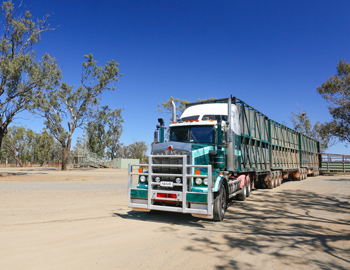New Chain of Responsibility laws for Australia’s heavy vehicle industry are coming in mid-2018.

The NHVR’s Chain of Responsibility Manager Kym Farquharson-Jones has been travelling across Australia outlining the changes to many of the 165,000 businesses which make up the heavy vehicle supply chain.
“These changes are a significant step forward in recognising that everyone in the supply chain has a role to play in heavy vehicle safety,” Kym says. “Primary producers also play an important role in supporting safe, reliable road transport to all road users, particularly heavy vehicles.
“Because they are part of the heavy vehicle supply chain, primary producers have for almost a decade had the same legislative obligations for heavy vehicle safety as other parties in the chain. These obligations are commonly referred to as the Chain of Responsibility or CoR.
“Amendments to the CoR laws coming later this year will align the existing laws more closely with workplace health and safety provisions.
“This means that all parties in the chain, including primary producers, must proactively reduce risks related to the safety of heavy vehicle transport tasks. Under current Chain of Responsibility laws primary producers may be responsible for breaches by drivers once they are detected.
“Although the laws will change, they will still only apply to activities that a person or business has responsibility for and could influence. In other words no one will be liable for breaches they cannot control.”
So what does this mean for primary producers? Let’s look at two types of primary producers in relation to heavy vehicle use.
Are you a primary producer who contracts transport services to another operator?
Some relevant areas of responsibility for you as a primary producer may include:
- Avoid requests, instructions, requirements or demands that may influence the driver to speed or drive while fatigued — whether written in a contract or made verbally.
- Ensure stock or loads are ready to load on time so that a driver is not unduly delayed and pressured to speed or exceed fatigue hours.
- Ensure safe access, while on your property, for the heavy vehicles and advise drivers of any relevant local knowledge.
- Ensure you consult with your transporter and other parties in the chain when setting timeframes for pick-up and delivery.
What should I do?
Use operators that provide safe and compliant transport activities. Consult your provider to ensure any safety risks are understood and steps are taken to mitigate those risks.
Are you a primary producer who owns and/or operates your own heavy vehicle?
The most relevant areas of responsibility for you as a primary producer will include:
- What and how much is loaded onto the vehicle, how the weight is distributed and how the load is restrained.
- That the vehicle is fit for purpose, mechanically safe and legally able to be used on a road.
- That the driver, who may be you, is not tired and doesn’t work longer than they are allowed by the law.
- That you understand the safety risks that your activities pose to the transport task—including packing goods for transport, scheduling travel and delivery times, and the impacts of delays in loading and unloading trucks.
- Avoid requests, instructions, requirements or demands that may influence the driver to speed or drive while fatigued — whether written in a contract or made verbally.
So what should I do?
Ensure you understand your responsibilities as a heavy vehicle owner or operator. For more information visit www.nhvr.gov.au/cor
As the NHVR travels across regional Australia meeting explaining the changes to primary producers there are always other scenarios that arise that require a common sense approach to safety.

 Accessibility tools
Accessibility tools

